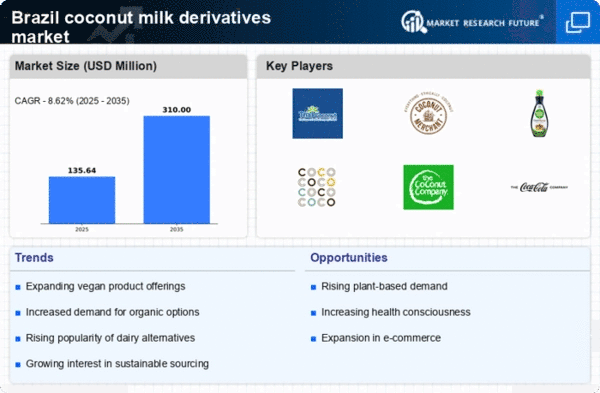Focus on Clean Label Products
The coconut milk-derivatives market in Brazil is experiencing a shift towards clean label products, as consumers become more discerning about the ingredients in their food. This trend is characterized by a preference for products that are free from artificial additives and preservatives. As a result, manufacturers are reformulating their offerings to meet this demand, leading to an increase in the availability of organic and minimally processed coconut milk derivatives. Market data indicates that clean label products are projected to grow by approximately 20% in the coming years. The coconut milk-derivatives market is thus likely to see a rise in consumer trust and loyalty as brands align their products with these clean label principles.
Rising Popularity of Ethnic Cuisine
The coconut milk-derivatives market in Brazil is benefiting from the rising popularity of ethnic cuisines, particularly those from Southeast Asia and the Caribbean. As Brazilian consumers become more adventurous in their culinary choices, the demand for coconut milk and its derivatives is increasing. This trend is reflected in the growing number of restaurants and food products that incorporate coconut milk as a key ingredient. Market analysis indicates that the use of coconut milk in traditional Brazilian dishes is also on the rise, further driving its acceptance and integration into local cuisine. The coconut milk-derivatives market is thus likely to see a boost in sales as more consumers seek to replicate these flavors at home, leading to an increase in product offerings and innovation.
Expansion of Retail Distribution Channels
The coconut milk-derivatives market in Brazil is witnessing an expansion of retail distribution channels, which is facilitating greater access to these products. Supermarkets, health food stores, and online platforms are increasingly stocking a variety of coconut milk derivatives, making them more accessible to consumers. This trend is particularly important as it aligns with the growing demand for convenience and variety in food shopping. Recent statistics suggest that online grocery sales in Brazil have increased by over 30% in the past year, indicating a shift in consumer purchasing habits. The coconut milk-derivatives market stands to benefit from this trend, as enhanced distribution channels allow for a wider reach and increased sales opportunities.
Growing Demand for Plant-Based Alternatives
The coconut milk-derivatives market in Brazil is experiencing a notable surge in demand for plant-based alternatives. This trend is largely driven by an increasing number of consumers opting for vegan and vegetarian diets, which has led to a significant shift in purchasing behavior. According to recent data, the plant-based food sector in Brazil has expanded by approximately 25% over the past year. This growth is indicative of a broader movement towards healthier and more sustainable food choices. As consumers become more aware of the health benefits associated with coconut milk derivatives, such as lower cholesterol levels and lactose-free options, the market is likely to see continued expansion. The coconut milk-derivatives market is thus positioned to capitalize on this growing consumer preference for plant-based products.
Increased Awareness of Nutritional Benefits
There is a growing awareness among Brazilian consumers regarding the nutritional benefits of coconut milk derivatives, which is positively impacting the coconut milk-derivatives market. Research indicates that coconut milk is rich in medium-chain triglycerides (MCTs), which are known to support weight management and provide quick energy. As health-conscious consumers seek alternatives to dairy and other high-calorie options, the demand for coconut milk derivatives is expected to rise. This trend is further supported by the increasing availability of educational resources and marketing campaigns that highlight the health benefits of these products. The coconut milk-derivatives market is thus likely to experience growth as more consumers incorporate these nutritious options into their diets.


















Leave a Comment